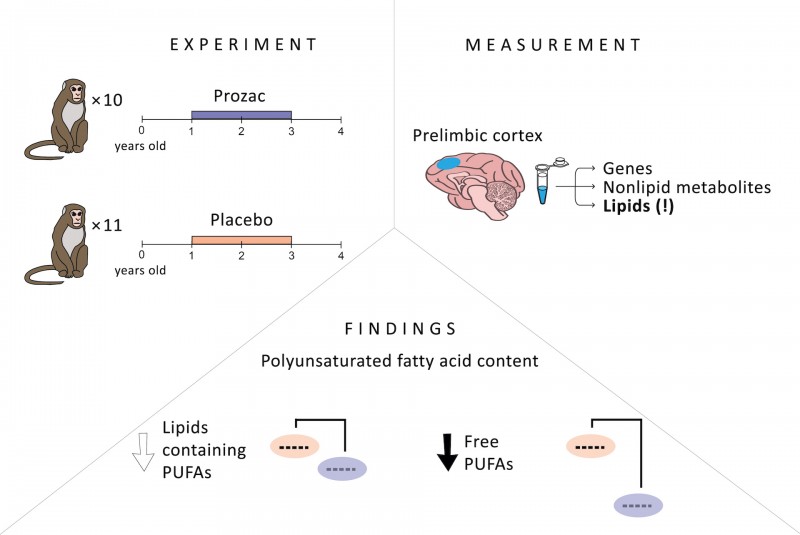Skoltech researchers and their colleagues from Russia, Germany, and the U.S. have found Prozac to reduce lipid concentrations in juvenile macaques who received the antidepressant for two years, compared to a control group of untreated animals. While none of the monkeys in the study were depressed, the findings still offer a plausible biochemical explanation for the drug’s side effects, particularly in young patients. The paper was published in the International Journal of Molecular Sciences.
Prozac is the most widely prescribed antidepressant in the world and is approved in the United States for treating children as young as 8 years old with major depressive disorder and 7 years old with obsessive-compulsive disorder. There is a certain amount of controversy surrounding this use, with some studies claiming the drug might actually increase the likelihood of suicidal thinking and behaviour and that this side effect could be more pronounced in young patients. This makes biochemical research into how fluoxetine — the active compound in Prozac — affects the brain, particularly in young age, highly relevant.
A series of earlier studies on the same group of animals carried out by the team’s collaborators investigated the effects of two-year fluoxetine administration to juvenile macaques on their impulsivity, sleep, social interaction, and the concentration of peripheral metabolites — the products of metabolism measured in the blood. This time, the researchers observed the drug’s effects on gene expression and brain metabolite content, primarily that of biomolecules called lipids.
“Lipids have long been known as the building blocks of cell membranes and as the molecules storing energy in the body’s fat tissue. More recently, their importance for proper brain functioning has become increasingly apparent. Lipids are abundant in the brain, where they are found not just in the cell membranes of neurons, whose properties they modulate, but also in the so-called myelin sheaths insulating axons — the brain’s ‘wiring.’ The brain is therefore a surprisingly ‘fat’ organ — in fact, it is nearly 60% fat,” the study’s first author, Anna Tkachev from Skoltech, said.
Biochemical brain research has tied lipid abnormalities to diseases, including schizophrenia, depression, and Alzheimer’s, making these molecules an important marker of brain health.
While the study only found slight variations in gene expression and insignificant changes in nonlipid metabolite content, decreased concentrations were observed for many of the over 300 lipids measured in the post-mortem brains of the macaques using a technique called mass spectrometry. The affected lipids were those that either incorporate what’s known as polyunsaturated fatty acids or are PUFAs occurring on their own, and not as part of larger lipid molecules. These so-called free PUFAs exhibited the most dramatic drop in their concentration. A familiar example of PUFAs are the omega-3 fatty acids, which humans ingest with sea fish and some other foods. They are important for health in general and for mental health in particular.

Image. The study looked at gene expression and metabolite content changes in the macaque brain following two-year administration of the common antidepressant fluoxetine, aka. Prozac. The concentrations of some products of metabolism turned out to be decreased compared to the control group of animals. So-called free polyunsaturated fatty acids proved to be affected the most. Credit: Reworked by Nicolas Posunko/Skoltech from Anna Tkachev et al./International Journal of Molecular Sciences
“One clue as to why the antidepressant might have more adverse effects when administered to young patients is that the younger a child’s age, the more rapid are the natural changes in the brain. Until the age of two, babies ramp up their brain PUFA content very rapidly, which explains one of the health benefits of breastfeeding: Breast milk is rich in fats and provides lipid building blocks for brain development. Although this lipid accumulation phase slows down progressively, it might not be 100% over in young teenagers, which is roughly the age equivalent of the juvenile macaques we studied,” Tkachev conjectured.
Examining the animals’ metabolite content in the blood, the researchers saw tentative indications of an overall PUFA drop in the body, though this was not nearly as pronounced as in the prelimbic cortex — the part of the brain analyzed in the paper.
“One important distinction between humans and macaques is that we have the alternative of ingesting PUFAs with fish, meat, and some other foods not typically consumed by macaques. They have to rely on their own livers to synthesize PUFAs. This means that if further research determines that the imbalances we observed have to do with disrupted lipid synthesis, this adverse effect could be alleviated in humans with a proper diet,” Tkachev explained.
“For this reason, it is necessary to measure metabolite content in human blood, and the traces of lipid imbalances left in macaque blood give reason to hope we might just find something similar in humans, without the need to actually dissect anyone’s brain,” the researcher went on. “If we don’t, it might be a sign of the imbalances stemming from factors other than synthesis disruptions, such as lipids having trouble entering the brain or possibly undergoing a redistribution toward other brain regions. New animal studies similar to ours but focusing on other brain parts could control for that.”
The study reported in this story featured researchers from Skolkovo Institute of Science and Technology, Lomonosov Moscow State University, Max Planck Institute of Psychiatry, Ludwig-Maximilians University, and UC Davis.
This research was supported by the Russian Science Foundation under Grant No. 19-74-00151.
Contact information:
Skoltech Communications
+7 (495) 280 14 81
